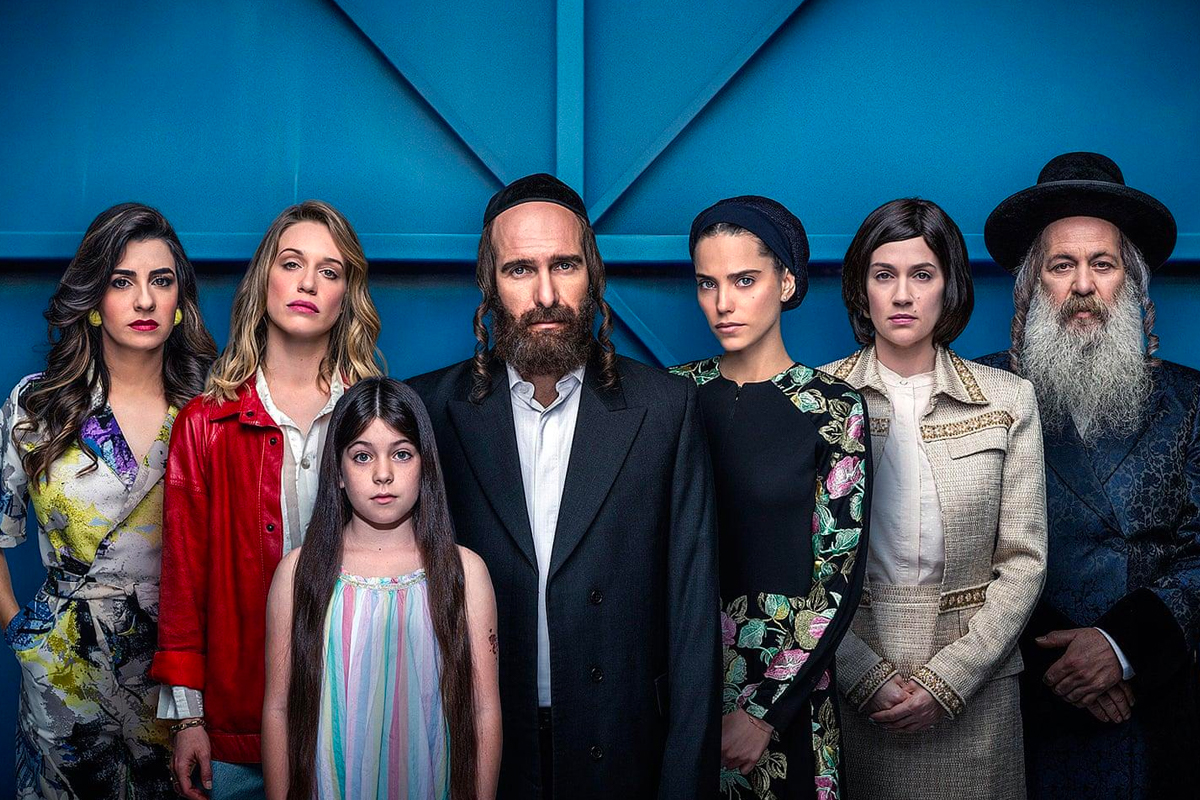Shtisel is back. The third season of the popular TV series about Haredi Jews is coming to Netflix on March 25, after airing on Israeli television earlier this year. But if you just can’t wait for more nuanced, thoughtful depictions of Orthodox Judaism on screen and need your next fix, you should hear about the limited series Autonomies, created by the team that brought you Shtisel, Yehonatan Indursky and Ori Elon. Even if you’ve never seen Shtisel, but you care about interesting stories that center the Jewish experience, you should probably hear about Autonomies, too.
In the dystopian world of Autonomies, a fictional Israel is still reckoning with the aftermath of a civil war, as the country is split between the Hilonim (secular Jews) in Tel Aviv and a Haredi (ultra-Orthodox) autonomy under strict religious law in Jerusalem (a Palestinian autonomy is named, though never a focus). But the cracks are showing. Members of the Hevra Kadisha (Jews who handle the responsibilities of the deceased) use coffins to smuggle porn, pork, and other non-kosher contraband into the Haredi autonomy. Rumors abound on the possibility of unification with the rest of Israel. And one girl — born from one world, raised in the other — becomes the symbol of the country’s precariousness when the identity of her birth mother is revealed.
At the 2019 New York Jewish Film Festival, Indursky said that he was inspired by his own upbringing when co-creating this show. The writer and director grew up Haredi and studied in the Yeshiva Ponevezh in Bnei Brak before leaving that world. You can feel the lived-in quality of his writing in the mumbled brachas (blessings) over food, the way a jazz song can become a niggun (traditional melody), and the natural way details of Jewish tradition are woven into the fabric of the story. You can also feel his sense of perspective, as he navigates the story from the dual perspectives of insider and one beyond.
Haredi life is nuanced, presented with flaws and favor alike. The rebbe of the autonomy (Shuli Rand) is an inspirational figure to many, but in his amber-hued study, he reigns like Don Corleone over his council. There is beauty in ritual, but trouble brews as characters push back against the stringencies enforced by the Shomrim (Haredi police). In the heightened reality of a dystopia, Autonomies raises the stakes of tensions and temptations without declaring an explicit bad guy. The clearest stance the show takes is an opposition to walls that keep some people in and others out.
A great piece of genre storytelling will often reveal truths about the ordinary world. Autonomies is a bit of Job, a bit of Jonah — the main character, Yonah Broide (Assi Cohen), retells the latter’s story when he’s inside his own belly of the beast — and it’s also a whole lot of the sentiment of Jewish suffering expressed over and over in Tisha B’Av kinnot (elegies): “אוֹי מֶה הָיָה לָנו” (oy, what has happened to us). Following in the tradition of Fiddler on the Roof and A Serious Man, Autonomies presents Broide wondering: Why does Hashem have to do this to me?
Of course, Broide’s not the only one suffering. The women of Autonomies, particularly Elka (Tali Sharon) and Batia (Dana Ivgy), reckon with the ways they are seen and ignored, as they struggle over the fate of a daughter who was switched at birth. Lawyers, husbands, police, and a rebbe push them to give up, to fight, or to endure, as they hope to hold onto a daughter thought dead by one and raised by the other. Even the girl, Goni (Nir Di-Nur), becomes seen more as a symbol of political strife than as an individual.
It’s been three years since Autonomies’ release in Israel, and it still hasn’t made much of a cultural splash in the U.S., where the show is only available on the streaming service Topic (which does offer a seven-day free trial, perfect for bingeing a three-and-a-half-hour Israeli limited series), and at the occasional film festival. I have not stopped thinking about Autonomies (no, really) since I first saw the show in 2019. Like Shtisel, it grounds its story in a reality of customs, restrictions, expectations, and self-doubt.
Watch it before you watch season 3 of Shtisel. Watch it after. Watch it and discuss it enough for the distributor, Keshet International, to make the show more widely available (is it too much to ask for an Autonomies Blu-Ray release?). Appreciate how great it is that we can have a Jewish work that is also a piece of powerful genre storytelling about division, personal struggle, and identity. And then, when you hear somebody tell you how excited they are to watch the new season of Shtisel, let them know: They need to hear about Autonomies, too.



